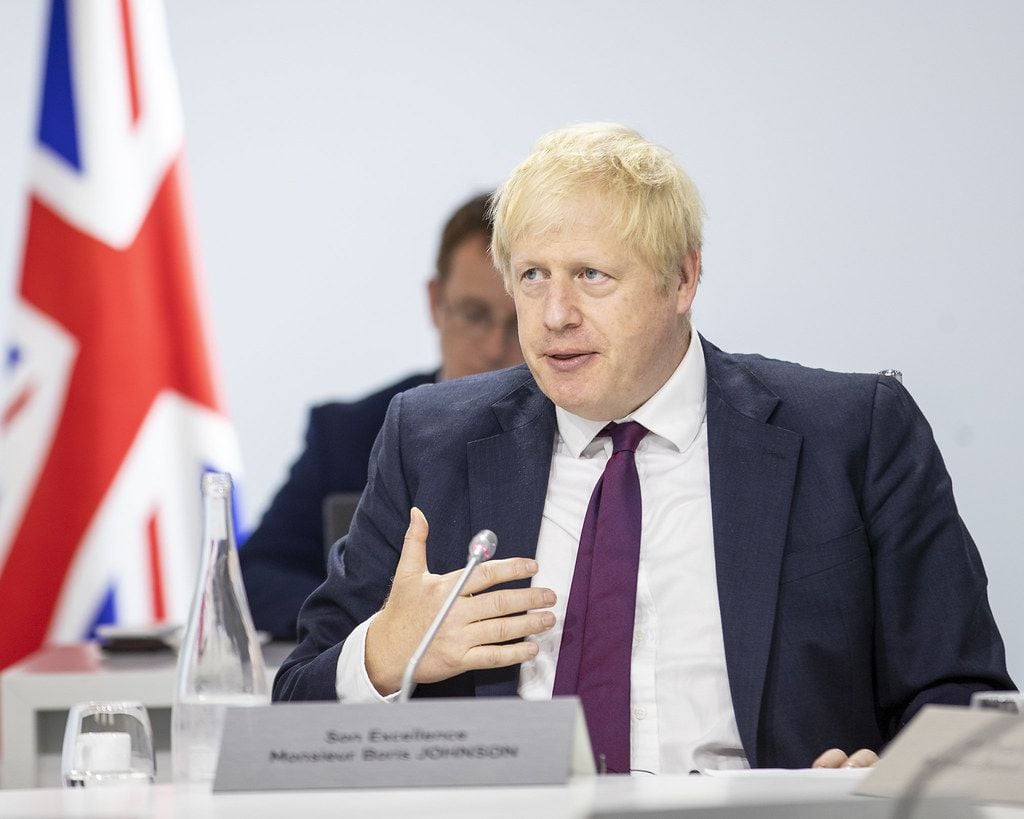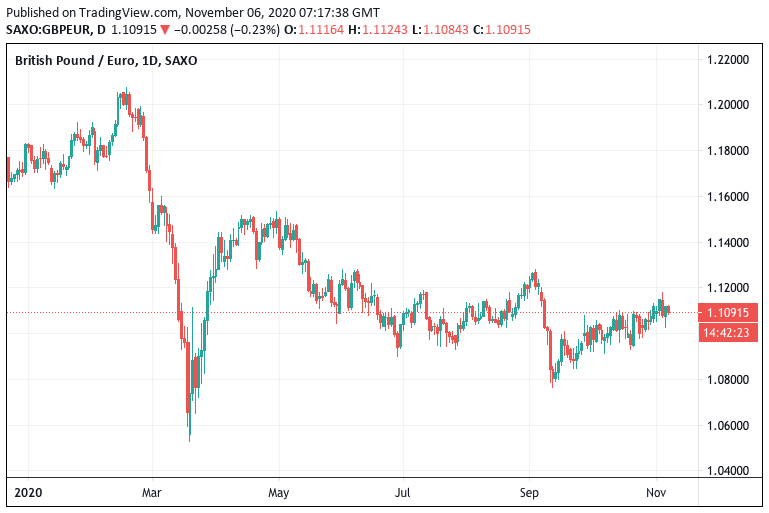Sell Pound Sterling against the Euro: Natwest
- Brexit deal no ailment for struggling GBP
- Brexit deal might only come late Nov./early Dec.
- UK economic underperformance to weigh

Above: File image of Prime Minister Boris Johnson. © Gov.uk
- GBP/EUR spot rate at time of publication: 1.1027
- Bank transfer rate (indicative guide): 1.0700-1.0780
- FX specialist providers (indicative guide): 1.0870-1.0890
- More information on FX specialist rates here
The British Pound is forecast to remain under pressure against the Euro over coming weeks by Natwest Markets, citing Brexit trade negotiations that won't conclude anytime soon and expectations for the UK economy to remain unattractive to international investors.
The UK high-street lender's investment banking arm says Brexit uncertainty should remain a feature for weeks to come as the EU sees benefit in letting the clock run down on negotiations, allowing them to extract further concessions from the UK.
The Pound tends to underperform at times of heightened Brexit uncertainties and therefore suggestions uncertainty could run until early December opens the door to potential downside.
"The EU’s need to compromise is less pressing given the impact on the UK under no- deal will be greater, so there’s potential value in running down the clock to apply additional pressure on the UK," says Paul Robson, Head of G10 FX Strategy EMEA at Natwest Markets in London.
Natwest Markets expect negotiations to "run to the wire".
EU leaders meeting in Brussels on Thursday and Friday to discuss the state of trade negotiations, amongst other topics. The summit has long been held to be a soft deadline for negotiations to reach a conclusion, indeed, the UK's Prime Minister Boris Johnson has maintained a view that negotiations should be ended if sufficient progress has not been made by this point.
However, October has seen the mood around negotiations improve from the dourness that characterised the first half of September; it was around this time that Sterling fell to multi-month lows against its peers. Progress in October has in turn yielded gains for Sterling, confirming Brexit continues to be a substantive driver of the currency:
The Pound-to-Euro exchange rate has recovered from lows at 1.0762 back to 1.1060 at the time of writing, the Pound-to-Dollar exchange rate has meanwhile recovered from September lows of 1.2676 to 1.3068 at the current time.
If Natwest Markets are correct in their assessment of talks running until late-November/early-December, the implication is that the two sides enter a war of attrition over the outstanding issues, notably fisheries, state aid and the governance of a future relationship.
Such an environment would typically generate the anxieties consistent with Sterling weakness, indeed, an increasingly confident market might face notable disappointment on the outcome of this week's EU summit.
"There is plenty of time for markets to reassess assumed no-deal probabilities as the remaining time to reach a deal shrinks. We therefore anticipate maintaining our long EUR/GBP positioning until we become more certain a deal is coming imminently," says Robson.
Should the two sides ultimately fail to reach an agreement, Natwest expect the economy to suffer "significant weakness in activity, as supply chains are disrupted, orders books are cut and capex projects are cancelled or postponed."
The EUR/GBP exchange rate is forecast to rise to 0.97 (GBP/EUR exchange rate of 1.03), and the GBP/USD exchange rate is forecast to fall to 1.20.
Should a deal be agreed, Natwest forecast EUR/GBP at 0.87 (GBP/EUR at 1.15) and GBP/USD moving to 1.33.
Those watching Sterling might be surprised to see the relatively restrained forecasts, after all the UK and EU would arguably have put to bed years of uncertainty.
Natwest explain the limited upside scope for Sterling is due to the significant readjustment the UK faces as its trading ties with EU shift:
"Any deal struck with the EU will fairly bare bones," says Robson.
But it's not just Brexit that will bother the Pound as strong headwinds are blowing against the economy as covid-19 cases increase, "the UK economy is facing some significant hurdles as we head into the winter months," says Robson.
Natwest Markets hold a view that those economies that have successfully contained the covid-19 pandemic and are not facing significant second wave events will outperform while others, such as the UK where cases are rising sharply, will struggle.
"The economy is struggling under the weight of a broadening and intensifying Covid -19 lockdown," says Robson.
Additional headwinds to Sterling's outlook include:
- Weaker inward Foreign Direct Investment flows on weak growth outlook.
- Restrictions on free movement of labour.
- Only limited scope for fiscal policy to support growth as the country's budget deficit is forecast to be 17.3% of GDP in 2020 and 7.4% in 2021.
"The challenging growth outlook comes at a time when the UK continues to run a large and persistent current account deficit (Q2’s narrowing is almost certainly a one off). A relatively poor growth outlook will make it difficult to attract enough capital to fund the current account deficit at current exchange rates," says Robson.

